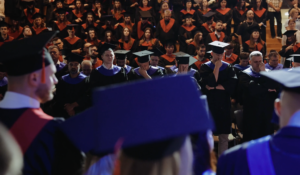

Astrological Institute
In August, the Astrological Institute in Phoenix, Arizona became the first school of astrology to ever receive accreditation from a nationally recognized body. With its credentials now in place from the Accrediting Commission of Career Schools and Colleges of Technology, the Astrological Institute can seek approval from the U.S. Department of Education for its students to receive federal grants and loans. According to Elise Scanlon, head of the Accrediting Commission of Career Schools and Colleges of Technology, the institute received accreditation because it demonstrated that its teachers are qualified and that its graduates can be placed in jobs.
Housed in part of a former elementary school, the Astrological Institute currently offers a diploma in astrology and psychology. To earn the diploma, students must pass six required courses: three each in astrology and psychology, plus at least four electives. Joyce Jensen, founder of the school, commented on the psychology requirements, "If you're going to be an astrologer, you really need the skills of counseling people."
Tuition is $5,300, with classes offered in the day and evening. Full-time students can earn a diploma in twelve months, but a majority of the thirty-two students now enrolled come at night, after working day jobs. With the respectability of accreditation, Jensen hopes to draw more young people looking to pursue astrology as a career.
Associated Press, August 27, 2001
Time For Prayer
In the wake of the September 11 tragedy, Texas Governor Rick Perry says that he sees no problem with ignoring the U.S. Supreme Court ban on organized school prayer. According to the Dallas Morning News, Perry stated his support for school prayer as he defended a decision to allow a Protestant minister to open a middle school assembly in Palestine, Texas with prayer.
"Any time you have a crisis that faces you, either in your personal life or as we have now in our country, reaching out to a supreme being is a very normal act," said Perry as he visited the school.
Samantha Smoot of the Texas Freedom Network, which monitors the activities of religious groups in education, disagrees with Perry's assessment, however. She says that the law is clear and that advocates of school-sanctioned prayer are simply choosing to ignore it. "Despite the governor's confusion over the issue, the Supreme Court has been remarkably clear about it," she said.
Still, Gov. Perry remains firm in his support of school prayer. "Maybe it's time that we talk about clarifying just exactly what we can do and what we can't," he said. "I think what people are concerned about is that their ability to say prayer, whether they are Jewish or Muslim or Christian or whatever, is being impeded by a very small minority."
ReligionToday News, October 26, 2001
Religion And Self-Esteem
At this year's annual meeting of the American Psychological Association, researchers presented evidence that religious involvement is the best indicator of psychological self-esteem among eighth-graders. According to Yong Dai and Rebecca Nolan of Louisiana State University in Shreveport, La. and Qing Zeng of Wells College in Aurora, N.Y., eighth graders who considered themselves very religious report the highest levels of self-esteem.
The researchers based their assessment on the results of "Monitoring the Future, a continuing Study of American Youth," conducted in 1999 by the University of Michigan's Survey Research Center. The survey was given to 1,261 eighth-graders from different parts of the United States – 570 males and 691 females. Survey respondents were asked to rank themselves as very religious, somewhat religious, not very religious, or not religious at all. The team correlated these four variables with responses to eight questions about self-esteem. The questions included four positive and four negative questions designed to measure self-esteem. In the final analysis, the students who considered themselves "very religious" responded most positively to the questions measuring self-esteem. Correspondingly, the "very religious" did not subscribe to the negative indicators of self-esteem.
Nolan described how her team interpreted the data. "We found that people who rated themselves as being 'very religious' answered each of the four positive indicators of self-esteem in a more positive manner," said Nolan. She commented that this means they feel that they are persons of worth who can do things as well as others and that they are satisfied with themselves.
"The eighth grade is a pivotal period," the psychologist said. "Students are right at the point where their self-esteem tends to be lower than at any other time. They're going through a lot of changes. They've reached the age where their peers are starting to matter more than family.
"At the eighth grade, their parents' opinion and the effect of their religious training tends to give them an edge over kids who do not have this foundation. For self-esteem you need a base on which to stand. You need a point of confidence, of thinking: 'I can do this. I think well of myself; I can take this chance.' And religion is one of these pillars on which they can stand."
United Press International, August 27, 2001










